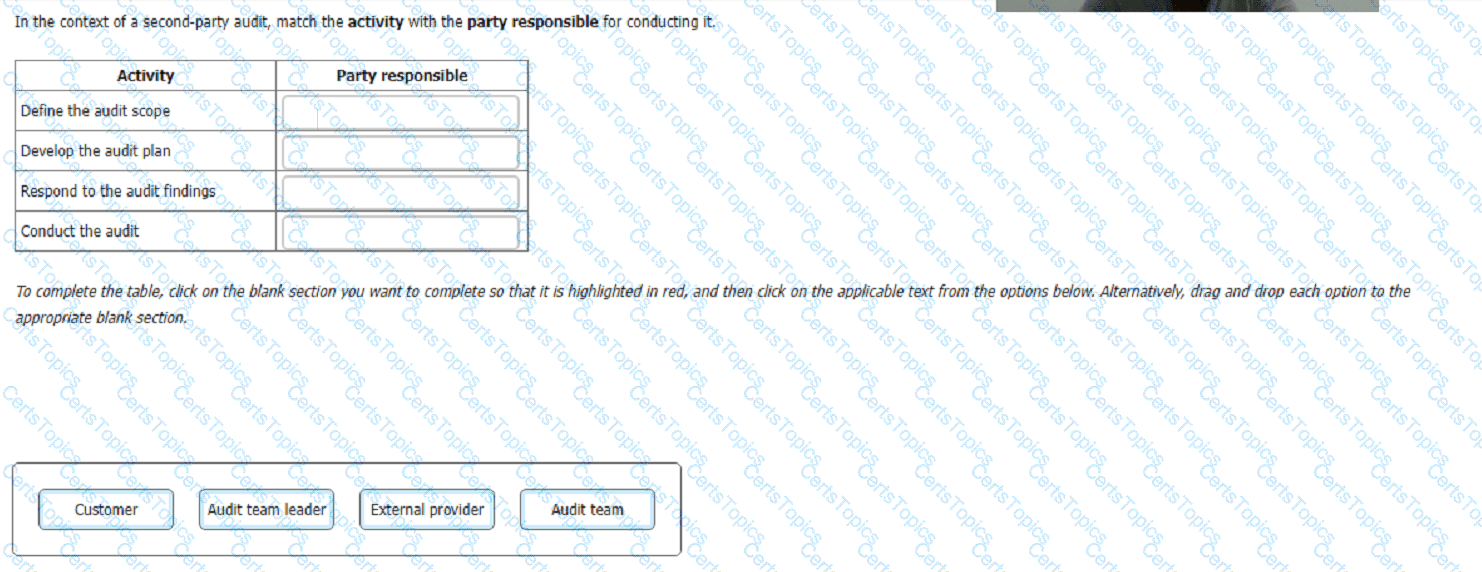The auditor could raise the following nonconformities to ISO 9001 based on the scenario:
•Option A: 10.3 - The organisation did not continuously improve. Reject rates were unchanged. This option is correct because ISO 9001:2015 clause 10.3 requires the organization to improve the suitability, adequacy and effectiveness of the quality management system. The organization did not demonstrate any improvement in reducing the reject rate of the finished product, which was a stated objective of top management. The corrective action taken by the organization was not effective in addressing the root cause of the problem and preventing its recurrence.
•Option B: 7.1.4 - The factory environment is not suitably maintained to prevent dirty products. This option is correct because ISO 9001:2015 clause 7.1.4 requires the organization to determine, provide and maintain the environment necessary for the operation of its processes and to achieve conformity of products and services. The organization did not ensure that the factory floor was clean and dry, which affected the quality of the products and increased the risk of nonconformity.
•Option C: 7.1.1 - The organization failed to provide the required resources to prevent nonconforming products. This option is correct because ISO 9001:2015 clause 7.1.1 requires the organization to determine and provide the resources needed for the establishment, implementation, maintenance and continual improvement of the quality management system. The organization did not provide adequate collection baskets for the products ejecting from the moulding machines, which resulted in products falling onto the factory floor and becoming nonconforming.
The following options are not correct:
•Option D: 9.2.2 - Report IA202 contained a poorly worded nonconformity (NC 3). This option is not correct because ISO 9001:2015 clause 9.2.2 does not specify the requirements for the wording of nonconformities in internal audit reports. The nonconformity (NC 3) stated by the internal auditor was clear and relevant to the audit criteria and audit evidence. The issue is not with the report, but with the corrective action taken by the organization.
•Option E: 8.6 - Dirty products were released to the customer. This option is not correct because ISO 9001:2015 clause 8.6 requires the organization to implement planned arrangements, at appropriate stages, to verify that the product and service requirements have been met. The scenario does not indicate that the dirty products were released to the customer, but that they were recalled and repaired then returned to the customers. The issue is not with the release, but with the production process and the environment.
•Option F: 7.3 - Staff were not aware that products were falling onto the factory floor. This option is not correct because ISO 9001:2015 clause 7.3 requires the organization to ensure that the persons doing work under its control are aware of the quality policy, relevant quality objectives, their contribution to the effectiveness of the quality management system, and the implications of not conforming with the quality management system requirements. The scenario does not indicate that the staff were not aware of these aspects, but that the management did not provide adequate resources and environment for the staff to perform their work. The issue is not with the awareness, but with the management responsibility and resource provision.
•Option G: 10.2.1 - Conduct of an investigation was not sufficient to understand the cause of the nonconformity. This option is not correct because ISO 9001:2015 clause 10.2.1 requires the organization to react to the nonconformity and, as applicable, take action to control and correct it and deal with the consequences. The scenario indicates that the Quality Manager conducted an investigation into the reject rates and identified the cause of the nonconformity. The issue is not with the investigation, but with the corrective action taken by the management.
•Option H: 8.5.1 - Production operations were not properly controlled to avoid reject products. This option is not correct because ISO 9001:2015 clause 8.5.1 requires the organization to implement production and service provision under controlled conditions. The scenario indicates that the production operations were controlled by the moulding machines, which ejected the products into the collection baskets. The issue is not with the production operations, but with the size of the collection baskets and the condition of the factory floor.
[References:, •ISO 9001:2015 Quality management systems - Requirements, •ISO 9001 Lead Auditor Course Material, Module 6: Reporting Audit Findings, Slide 14: Writing Nonconformity Statements, •ISO 9001 Lead Auditor Training Course - IRCA Certified, Section 6.2: Reporting Audit Findings, •Lead Auditor Exam Preparation Guide (EPG) Template - PECB, Section 3.2: Exam Content Outline, Subsection 3.2.1: Section 1 - Audit Fundamentals, Subsection 3.2.2: Section 2 - Audit Principles, Subsection 3.2.3: Section 3 - Audit Process, Subsection 3.2.4: Section 4 - Audit Competencies, , , ]
